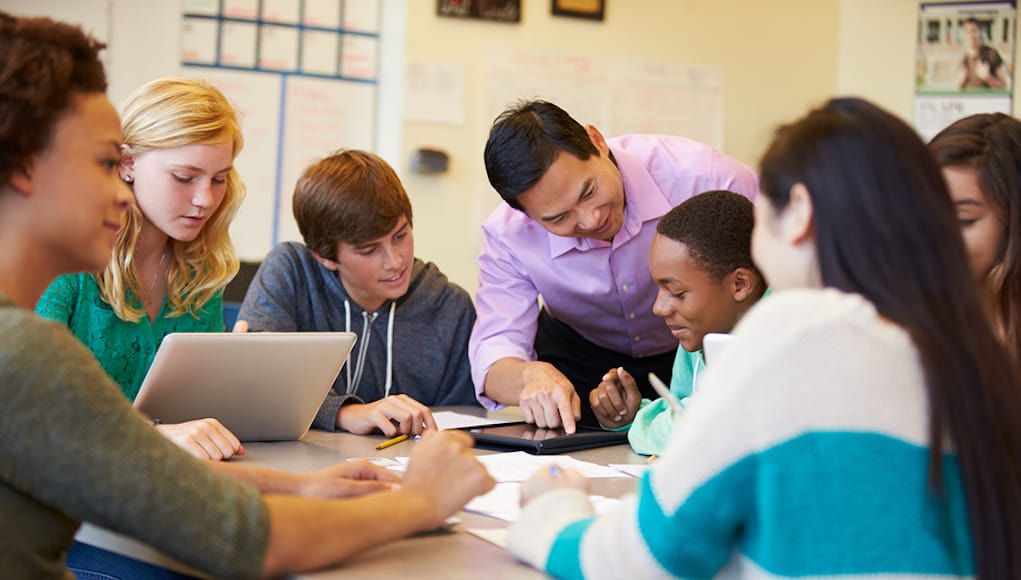How New Models are Preparing Students for the Future of Work

Today’s students will be an integral part of tomorrow’s workforce.
This statement is no truer now than it was 20 years ago, or in 1980, 1960, 1940 or 1920. Yet the characteristics of this group have drastically changed over time, evolving with (and sometimes in anticipation of) societal shifts due to political, technological and cultural influences.
The newest generation to come of age—Gen Z—is currently engaged in studies from middle school through college, or just beginning a career. Though infrastructure issues or socioeconomic disadvantages mean that a digital divide persists for some, these young people have largely been accustomed to technology from an early age. This is the first generation that hasn’t had to be introduced to the Internet; they have grown up with it at their fingertips. Like the Millenials before them, Gen Z has become immersed to the point that they are creators versus passive consumers.
And while much has been written about the impact of entrepreneurship education on K-12 students, the variety of ways in which they’re currently engaging with content, with educators and with one another are enabling them to acquire practical foundational skills for the future of work—a future that is increasingly distributed, diverse, device-agnostic and asynchronous in nature.
Digital project management
The online portfolios students are building and the collaboration tools they’re using to work with one another aren’t unlike those of today’s knowledge workers. Though technology will undoubtedly morph over time, the interfaces students are familiarizing themselves with will impact their ability to navigate future programs. From an ideological perspective, the skills students are gaining as they manage digital projects—from an understanding of technical logistics to planning, organization, problem-solving and negotiation—will serve them well in a world where many workers will potentially be located miles (if not time zones) apart from one another. Those who choose to become entrepreneurs will be able to use this foundational knowledge to more easily construct global businesses and manage distributed teams.
Time management
In elementary and secondary schools employing what’s been called the ‘factory model’, students follow rigid schedules and work on content in lockstep with one another. Models that instead encourage personalized learning and student mastery are upending this centuries-old system, and with them, students are assuming more active roles in their own education. Competency-based programs that emphasize mastery are empowering students to consume material at their own pace. Other programs, such as those that follow a Hero’s Journey, promote student agency by enabling kids to choose their own paths. Each is possible at scale through the use of edtech. These individualistic approaches to education have resulted in a personalized experience that supports a variety of learning styles and needs. With time management in the hands of each student, they’ll be prepared for careers that grant them more autonomy than their parents and grandparents likely experienced.
Online communication
Whether scrolling through social content, product descriptions or recent news items, even the most reluctant readers are navigating through a world based on text (or hypertext). With face-to-face work environments no longer the sole option for professionals, written communication has taken on a higher level of importance. Knowing how to clearly and concisely offer feedback via email or instant messaging programs—or to more effectively search for information on the web, for example—have placed communication at the forefront of critical 21st-century skills. Much of the communicating in knowledge work will take place in the digital space. Add to this the global and multigenerational nature of the knowledge economy, and students will be expected to take a nuanced approach to communicating with those of other cultures and mindsets.
Cultural sensitivity
Educators are increasingly able to open their classrooms to the world. Through the use of free or low-cost digital programs like social media networks and video-sharing platforms, they can invite synchronous and asynchronous interaction with members of their own communities, with industry professionals and with those in academic institutions around the world. Large foundations and enterprises like Google are also supporting classroom exchanges that cross time zones and borders. Exposure to different cultures through dialogue provides students with a deeper, more personal understanding of the experiences, backgrounds, and motivations of those who may live lives that appear to be very different from their own. In a more globalized society, students who possess the ability to interpret, understand and respect cultural differences will have an advantage.
Lifelong learning
Today’s students have more opportunities than those of previous generations to guide their own learning at a manageable cadence. They also will be expected to adapt faster on the job than those who came before them. These two situational aspects in turn will orient today’s students toward a lifelong love of learning, as the focus is on acquisition and aptitude versus a forced timeframe for completion or set interaction points. Moreover, as the various types of tools, systems and technologies students use are fluid, they grow in adaptability and flexibility. When polled, employers currently cite these two characteristics as being highly valuable, both for onsite and remote work.
High school and college studies don’t have to provide a focus on specific disciplines in order to be powerful springboards for students’ future success. Opportunities to enable and empower young learners with skills to serve them and society at large in the as-yet-unknown future of work are readily available and accessible to educators today.
For more, see:
- 5 Ways to Make All Students Lead Learners
- Learning to Make a Difference at One Stone
- Teaching a Big School New Tricks: The Huntley 158 Competency Pilot
Stay in-the-know with innovations in learning by signing up for the weekly Smart Update.
Kristi DePaul (@reallykristi) leads Founders Marketing, a remote content marketing firm that serves organizations focused on the future of learning and the future of work.






0 Comments
Leave a Comment
Your email address will not be published. All fields are required.